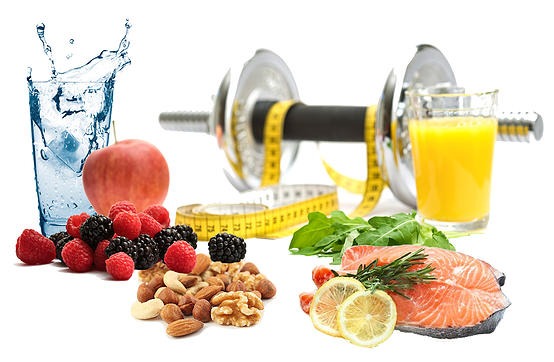Nutrition for Sports

Nutrition for Sports
Whether you are a bodybuilder, a professional athlete or simply exercising to improve your health, sports nutrition plays a key role in optimizing the beneficial effects of physical activity. Making better decisions with your nutrition and hydration can result in improved performance, recovery and injury prevention.
Consuming the right balance of food and drink is important for everyone. Yet those actively participating in sport on a regular basis need to be aware that it can also affect their performance. Fats, protein and carbohydrates all provide your body with fuel to maintain energy. Carbohydrates are the primary fuel used by working muscles.
Adequate intake is essential for preventing muscle fatigue. While you should monitor your fat intake, you should not remove it from your diet completely. Fats provide fatty acids that can be used as a source of energy – especially if your exercise sessions last longer than one hour. Fats also provide the building blocks for hormones and formation of cell walls. Protein can be used as a source of energy and is critical for building new muscle tissue. If you are taking part in resistance training, your body will require additional protein. Do’s And Dont’s
Do’s
- Eat adequate high carbohydrate meals every day to keep glycogen stores full and make most of your training sessions.
- Allow 3-4 hours digestion time for a large meal, 2-3 for smaller meal, 1-2 for blended or liquid meals and less than one hour for smaller snacks
- If you eat less than one hour before the event be sure to snack on any tried and true low fat high carbohydrate snack
- It’s best to have high glycemic index foods during and after exercise such as Glucose, Potatoes, Bagels, Raisins, Oatmeal, Sugar etc
Don’ts
- Dehydrate your body.
- Maintain proper balance of intake and output.
- Balance your protein and carb intake wisely.
- Alcohol & smoking should be avoided totally.
Food Items Easily Consumed By Sports Person
- Cereals: Brown rice, Oat meal, Brocken wheat, Ragi, Quinoa, Maiz grit, Sweet corn.
- Pulses: Chickpeas, Kidney beans, moong dal, masoor dal, soybeans.
- Vegetables: Broccoli, Kale, Spinach, Lettuce, Beet, Potatoes, Carrots, Sweet potatoes, Beans and all 4) other vegetables( especially the green ones such as spinach, lettuce, leeks, broccoli, asparagus, peas, cabbage and beans, are high in minerals, calcium, iron and other vitamins)
- Fruits: Avocado, Banana, Custard Apple, Pears, Grape and Watermelon, Oranges and Apple (sweet corn, bananas are good for carbohydrate loading before even)
- Milk and Milk products: Skim milk, Paneer, Cottage Cheese, Yoghurt.
- Meat, Fish and Egg: Lean Meat, Chicken Brest, Tuna, Salmon, Tilapia, Sword fish , Cod.
Oil: 1.5 Tbsp/ day( Olive oil, Mustard Oil, Rice bran Oil, Canola oil )
